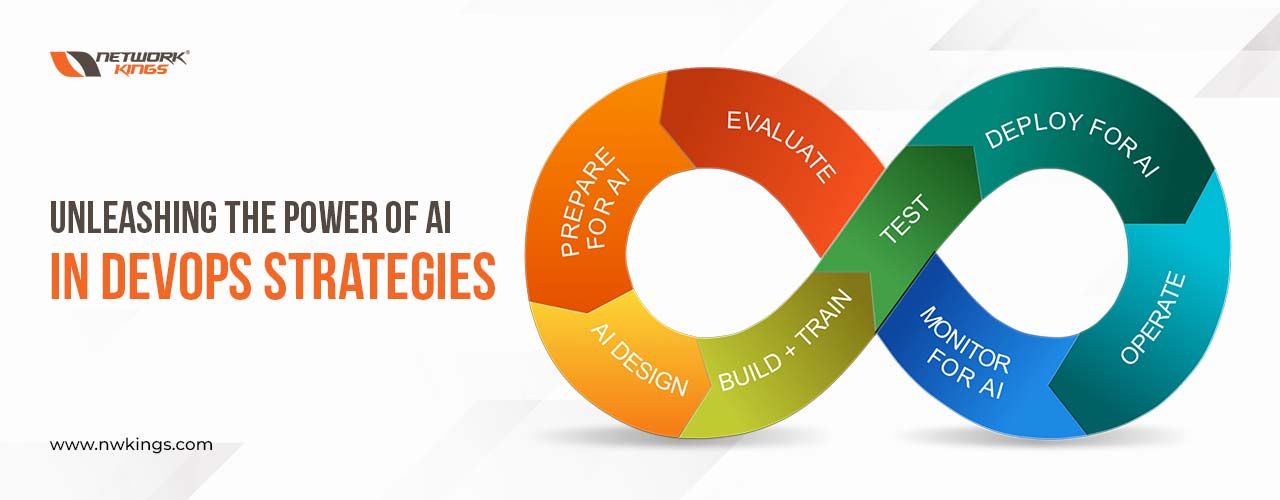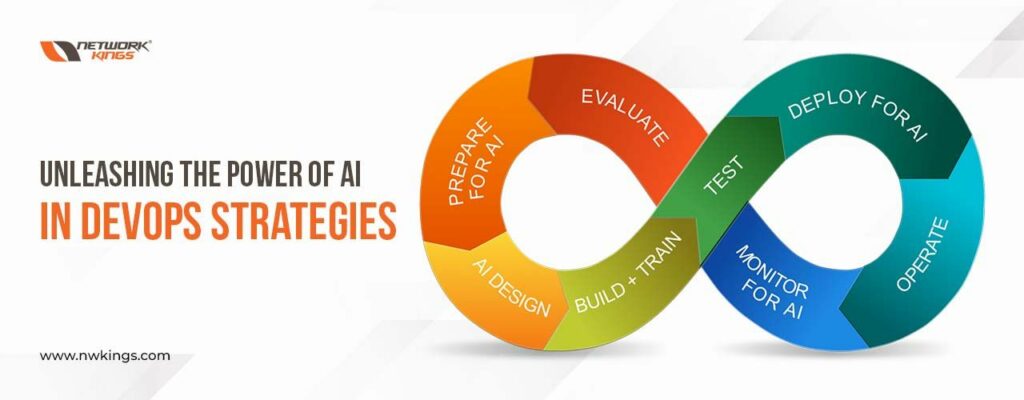
How can a DevOps team take advantage of Artificial Intelligence (AI)? has become a big question these days. The digital revolution has furnished a great many possibilities, with Artificial Intelligence (AI) proving particularly stimulating. AI holds the potential to completely transform how DevOps teams carry out their work by authorising automated processes, augmenting scalability and facilitating in-depth analysis of data that is essential for development and operations. Therefore, it would be judicious if DevOps groups gave close consideration to the possible returns on investment available from using AI within their organisation.
In this blog post, we shall discuss some of the advantages related to embracing AI into your DevOps environment; ranging from expanding automation right through to incorporating diverse sources of data – as well as proffering advice concerning where one can begin when adopting an approach which incorporates artificial intelligence technology..
Brief Overview of DevOps and Artificial Intelligence

DevOps is a method that advocates for communication, cooperation, integration and automation to refine the software delivery process. It encourages an approach which allows for constant provision of value whilst establishing a culture of collective ownership along with communal accountability among teams. On the other hand, Artificial Intelligence (AI) is centred on constructing intelligent machines competent enough to carry out tasks commonly requiring human intelligence.
In recent years, AI and DevOps have joined forces to offer organisations improved suppleness as well as productivity through automation. Leveraging AI technologies such as machine learning, natural language processing, computer vision and robotics process automation (RPA), staff members attached to DevOps can automate habitual activities while tidying up procedures simultaneously.
Moreover, by using predictive analytics via AI alongside intelligently managing resources organizations are enabled to forecast their customers’ needs earlier than they materialize in reality. Additionally, availing of automated testing processes ensures that DevOps personnel acquire enhanced proficiency over manual testers when it comes to identifying potential issues rapidly.
Eventually, therefore, utilizing the correct balance between both tactics leads companies towards optimizing their assets all at once providing better products with greater precision even faster than before.
Importance of AI in Today's Technological Landscape
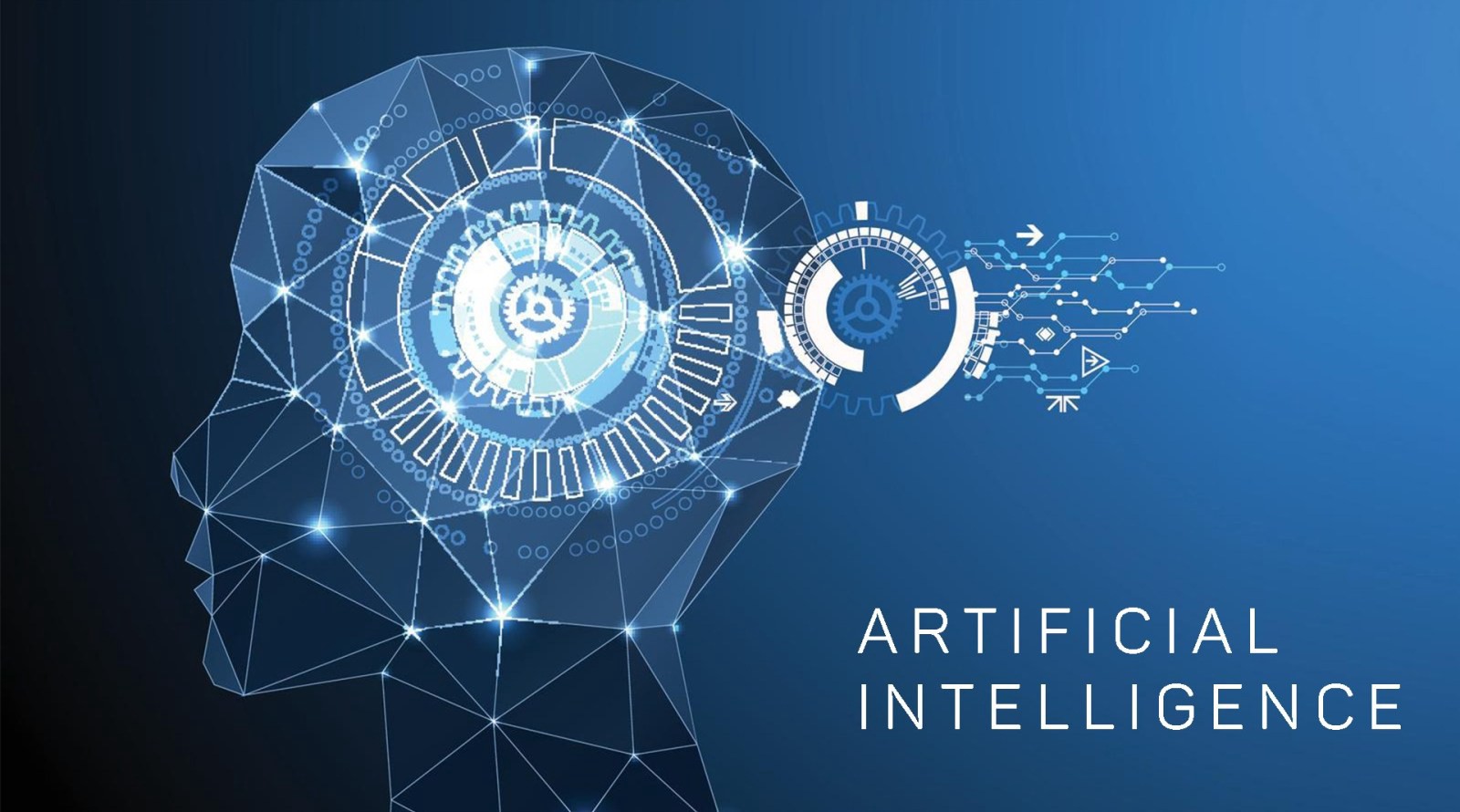
There is no denying that Artificial Intelligence (AI) has made a significant presence in the contemporary technology market. Its capacity to rapidly recognise patterns, process data quickly and provide efficient solutions for difficult issues makes AI technology an invaluable asset. It is widely acknowledged that employing AI will revolutionise how DevOps teams work, furnishing approaches which are both cost-effective and productive. Through collecting information from sources like customer feedback, AI can assist DevOps groups by delivering them with precious knowledge of their operations thereby enabling them to make informed decisions.
AI can additionally provide DevOps teams with current data on industry developments and competitor movements, thereby enabling companies to remain ahead of the competition. Concerning implementation, AI can be utilised by DevOps teams in a variety of methods. For instance, it is capable of automating manual processes such as organising release cycles or predicting demand for individual products or services through predictive analytics.
In addition, AI may be used to assess application performance and search for potential areas requiring improvement; this allows DevOps teams to extend more satisfactory customer experiences. Moreover, the employment of machine learning algorithms furnishes devops personnel with an enhanced understanding of their customer’s preferences and behaviour patterns via analysing vast quantities of data produced from their applications.
Finally, AI technology facilitates collaboration between different departments within one organisation making it simpler for them to access similar source material and transmit information in a more efficient way.
How can a DevOps Team Take Advantage of Artificial Intelligence (AI)?
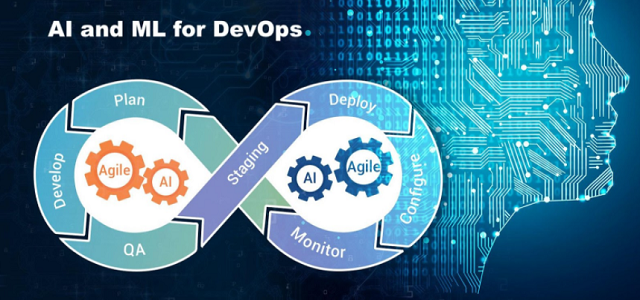
DevOps AI is a notion that has been garnering increasing attention in the software development realm for some time. It pertains to unifying Artificial Intelligence (AI) with DevOps processes and technologies, all aimed at upgrading the efficacy and dependability of software products. The prime objective of DevOps AI is to make use of machine learning algorithms to detect anomalies, automate recurring duties, and lessen human involvement related to overseeing intricate software systems; thus enabling teams to deploy code more swiftly, realise issues sooner and avert critical mistakes ahead of they arise.
As such, by leveraging the capabilities of DevOps AI, organisations can offer enhanced service to their customers while streamlining their internal operations. At a base level, DevOps AI involves utilising machines as an additional pair of eyes and ears which circumspects large-scale projects. Through studying patterns in user activity or system performance data, processing systems can rapidly discern flaws that could go unheeded by humans; a degree of understanding of the codebase which was beyond reach previously is made accessible through this technology and teams become enabled to detect problems earlier on in the development sequence before they turn out to be major issues.
By making use of advanced analytics techniques such as Natural Language Processing (NLP), teams can acquire greater insight into customer requirements and adjust services to optimise them. Moreover, by incorporating DevOps AI tools like predictive analytics platforms or automated anomaly detection systems, organisations can increase their capability for creating a higher quality product at an accelerated speed. Additionally, the observations brought about by these instruments may also be utilised for proactive determination-making regarding resource division and budgeting judgements.
In summation, DevOps AI has the potential to revolutionise how groups work within an organisation by permitting them access to artificial intelligence technology with increased effectiveness and enhanced consumer experience outcomes.
Key Benefits of AI Integration in DevOps
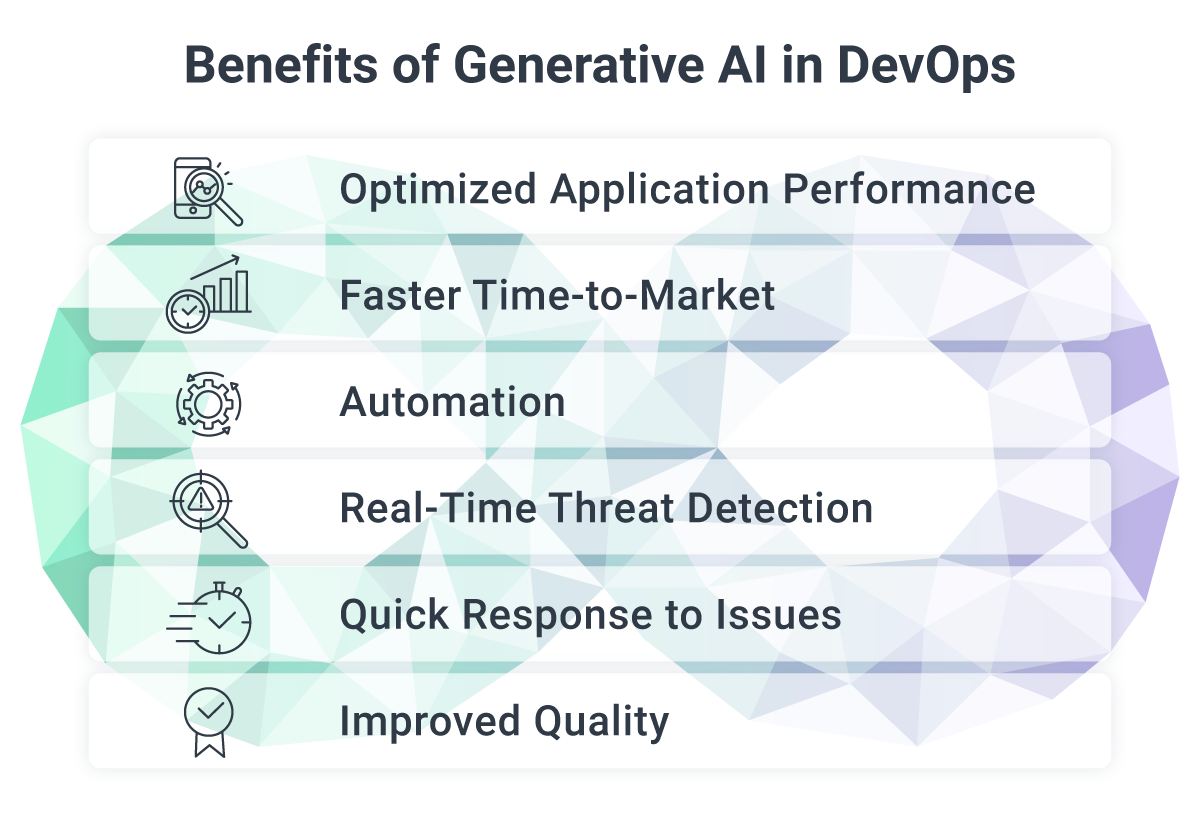
- The incorporation of Artificial Intelligence (AI) into DevOps is progressively alluring to organisations that are endeavouring to perfect their IT processes. AI-driven computerisation can bring down the time and cost related to traditional development operations, while concurrently amplifying the general quality of a company’s yield.
- Additionally, leveraging predictive analytics and joining it with existing DevOps procedures permits companies to conjecture future patterns and make superior decisions in real time. Through proactively managing processes and verifying compatibility between apparently disconnected systems, AI integration assists organisations in remaining ahead of industry best practices.
- Another key advantage of incorporating Artificial Intelligence (AI) into DevOps is its capability for accurate data analysis and reporting. AI algorithms can process large datasets more promptly and precisely than humans could ever do, enabling businesses to acquire valuable insights from intricate sources of information.
- This helps them maintain competitive advantages by allowing them to spot patterns or irregularities which may otherwise have been overlooked through manual examination. Moreover, enhanced automation facilities permit companies to monitor finer details such as server utilisation, system health metrics, and customer feedback without necessitating any additional resources or human effort.
- Finally, the integration of AI into DevOps enables organisations to be responsive towards their customers’ needs or changing market conditions with greater haste. Predictive analytics can be employed for proactive feedback loops that automatically detect failings or areas requiring improvement before consumer problems emerge and are created successfully.
Automated deployment platforms also render assistance when it comes to helping companies keep up with changes occurring in the industry alongside optimising resource management across different device types as well as platform varieties alike By streamlining development operations via the tactful use of AI technologies, organizations can allocate shorter release cycles while still guaranteeing higher standards concerning service delivery towards consumers simultaneously.
Understanding the Role of AI in DevOps Automation

Artificial Intelligence is a rapidly growing technology that is revolutionizing how DevOps teams operate. To remain competitive within an environment of rapid change, it has become imperative to recognize and take full advantage of the role AI can play in DevOps automation. There are various benefits associated with incorporating Artificial Intelligence into one’s operations; such advantages include increased scalability, improved agility and enhanced integration capabilities.
Furthermore, AI-based automatization equips teams with additional resources enabling them to employ their current toolsets more effectively while also ensuring greater precision when monitoring tasks as well as faster deployment times.
Upon its application to DevOps environments, Artificial Intelligence may be utilised as a component of an uninterrupted delivery pipeline. With the assistance of AI-driven automation, DevOps teams can discharge code swiftly while guaranteeing that any modifications are properly tested and released without requiring manual interference. This results in productive deployments which is free from error and do not necessitate human engagement or administration.
AI-driven automation additionally affords automated testing, permitting thorough examinations before deployment takes place. This helps ensure that systems remain secure and dependable when new versions of code are disseminated into production conditions.
DevOps teams may likewise benefit from the incorporation of Artificial Intelligence to forecast future necessities by deploying algorithms that discern patterns and trends from preceding operations. In so doing, they shall be aware of what resources would be required for optimum performance on upcoming occasions based on former experiences with analogous workloads.
Additionally, these algorithms can assist in locating potential dangers associated with forthcoming projects or tasks such that mitigation measures can be implemented beforehand instead of responding rapidly when a predicament arises during stages of operation execution.
Artificial Intelligence also has an impact on the optimisation of workloads within a system, to prevent any single component from being overburdened and detrimentally affecting other areas such as data management or application performance. By incorporating AI-driven optimisation techniques, for example, deep learning models, systems can regulate resource allocations dynamically according to user behaviour patterns and current conditions with the intent of achieving optimal levels across platforms while retaining cost efficiency.
In summing up, comprehending Artificial Intelligence’s function in DevOps automation is key if one wishes to remain competitive today. By understanding how it functions and harnessing its advantages suitably, DevOps teams can gain tremendous benefits compared with their competitors whilst simultaneously minimising manual labour associated with deployments and resource management tasks without sacrificing security or stability standards.
Exploring the Process of DevOps AI Adoption in Businesses
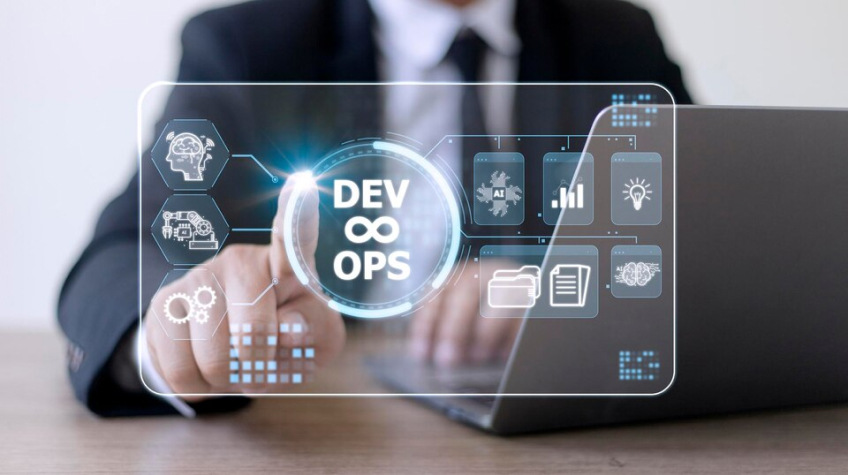
DevOps teams are discovering that Artificial Intelligence (AI) offers a range of benefits when it comes to refining operations. AI can facilitate the automation of processes, locate issues before they arise and assess data for revelations concerning user behaviour and inclinations. The essential factor in effective DevOps AI adoption is perceiving how it may be exploited, and then putting it into practice suitably. To begin with, teams must first determine what type of AI solution they intend to apply. For instance, will they choose an offering based on cloud technology or develop an on-premise solution?
Having ascertained the preference, it is then necessary to assess which algorithms should be applied. Typical choices here include deep learning algorithms, natural language processing (NLP) and predictive analytics; each of these has its range of capabilities and advantages that require careful consideration before proceeding onward. The following step involves incorporating the AI system into existing procedures. This could necessitate plotting out current workflows or designing new ones with reliance on AI in mind.
It is of paramount importance to guarantee that the AI system adheres to security standards and regulatory requirements about data privacy and protection, particularly when personal or confidential information has been gathered or needs preserving as a component of the project. After successful integration, deployment in an operational environment for trialling must be executed.
Teams ought to undertake tests so they can ascertain if their results are satisfactory before disseminating them amongst firm systems or products. Finally, once implementation has taken place, teams should evaluate outcomes and monitor trends linked with user actions to improve their technique over time.
Real-world Examples of Successful AI Adoption in DevOps
As businesses endeavour to capitalise upon more programmed processes, DevOps teams have started consolidating Artificial Intelligence (AI) into their practices. AI holds the guarantee of drastically enhancing performance and intensifying agility. One of the most proficient methods for accepting AI in DevOps is through real-world models of successful combination. By inspecting these examples, it is conceivable to procure profitable understandings concerning how best to incorporate AI into a DevOps work process.
An illustration of fruitful AI Acceptance in DevOps came American Express
The financial services company had been confronting an impediment with their applications not running as rapidly as they wanted them to, leading to user discontentment. After several endeavours at fault-finding, the team determined to introduce an AI-based system that could automatically recognise and rectify any issues in production server logs.
It was unsurprising that this system established itself as remarkably effective; application speeds rose by 40%, while customer gratification augmented twofold within just two weeks of implementation.
Another instance arrived from Fraser Health Authority, which employed IBM Watson for IT Operations (WITO) for the automation of incident resolution and preventive maintenance activities.
This enabled the IT team at FHA to enhance their service quality and react more quickly when incidents occurred, consequently leading to a 30% decrease in incident response times and a 40 per cent reduction in mean time-to-repair (MTTR). This also allowed the organisation to free up its IT personnel so that they could concentrate on other duties without compromising either service excellence or responsiveness. These are two prime instances of DevOps teams profitably leveraging AI tools for amplified productivity as well as superior overall outcomes.
When embracing AI within their organisations, those involved ought to pay heed to success stories such as these – not only because they offer outstanding guidance concerning how best to incorporate AI but also because they demonstrate that it can be carried out effectively if done correctly.
Challenges and Hurdles in Implementing AI into DevOps
As DevOps teams look to avail of the benefits of Artificial Intelligence, they must be cognizant of the challenges and impediments that come with implementation. To begin with, AI can prove rather difficult to elucidate and present how it would bring value to the team.
Consequently, for effectual integration of AI into DevOps processes, such teams ought to consider taking sufficient time to explain each factor involved as well as underline any advantages that might result from its introduction. Secondly, there is a financial consideration related to bringing AI on board; this entails procuring or devising requisite platforms/resources.
It can at times be tricky for DevOps teams to acquire the necessary additional funding. In addition, these squads must boast an appropriate array of skills to implement Artificial Intelligence technology successfully. As opposed to attempting a multitude of tasks concurrently, it may be more prudent for such groups to concentrate on one particular case initially so that its utility could accurately measured before resources are allocated towards full incorporation.
Ultimately, data precision is imperative if AI integration into DevOps is going to pay off; thus, assessment of information goodness should take precedence over any construction work with the objective that whatever intelligence is harvested from this material will have integrity. All those difficulties need acknowledging and handling if we wish for the successful implementation of AI within DevOps structures.
Future Prospects of AI and DevOps Collaboration
The advent of Artificial Intelligence (AI) has presented an entire world of opportunities to DevOps teams. AI technology can provide numerous benefits for DevOps, comprising improved automation, increased collaboration and predictive analytics. Automation has been a critical factor in the success experienced by DevOps teams over recent years. With the implementation of AI, crews can automate more intricate tasks than ever before; consequently saving them time and resources. Moreover, AI is capable of locating connections between processes quickly and identifying any likely issues that could arise before these materialise as problems.
Moreover, the potential of AI technology to facilitate better collaboration between DevOps teams is immense. By leveraging artificial intelligence-driven insights and predictive analytics, groups can make sound decisions regarding their operations quickly as opposed to manual methodologies which take more time. This implies that complex projects could be finished promptly with superior results in terms of quality. Furthermore, using predictive analysis furnishes DevOps personnel with another perspective on their development environment; this enables them to find where progress needs.
Essential Tips for DevOps Teams to Effectively Utilise AI
The successful implementation of Artificial Intelligence (AI) across the DevOps workflow can open up a range of advantages, from optimising deployment times to elevating operational efficiency. Nevertheless, for organisations to successfully utilise the power of AI and reap these rewards, several essential tips must be taken into consideration.
Initially, DevOps teams must ensure they have in place personnel who possess the required skillset and knowledge base. This entails data scientists, engineers as well and software developers – all equipped with mastery in both machine learning algorithms and IT operations. Secondly, DevOps teams should invest in technologies which aid the integration of AI into their existing processes; automation tools along with cloud technologies may assist them in streamlining training models intended for deployment within their environment efficiently.
Lastly, it will be beneficial if they evaluate the cost-benefit associated with deploying such solutions; determining areas whereby return on investment is achievable alongside how this would influence other elements related to IT operations would help immensely here. By embracing the aforementioned three critical hints, DevOps crews could benefit from implementing strategies based on AI concepts while unlocking its full potential thus empowering businesses significantly.
In conclusion, the integration of Artificial Intelligence into a DevOps team’s workflow can bring about considerable rewards. AI has proven useful in automating tasks, streamlining procedures and providing increased visibility to both the performance as well as the health of software applications. By taking full advantage of AI’s propensity for learning from data and producing meaningful insights, DevOps teams can expedite their development process while also improving upon quality assurance; thus leading them towards more intelligent solutions when faced with issues.
It is important to note however that successful implementation cannot be achieved without proper investments being made in terms of necessary tools and experts alike – this must not be overlooked if one wishes to take part in an effective adoption process involving AI technology.
The DevOps Master Program from Network Kings represents a perfect way to progress one’s career in the greatly sought-after area of devops.
For those seeking a change in profession, or wanting to augment their existing comprehension, this program provides an exciting prospect to be established as a highly knowledgeable practitioner within the industry. As part of this exhaustive coursework, participants will study how to formulate strategies and policies; put into action processes and tools; present organisational support as well and much more.
Through its amalgamation of theory with practical applications, it bestows pupils with all the requisite knowledge and expertise so that they may drive accomplishment in their business enterprise. Therefore why defer? Instigate now by enrolling on the DevOps Master Program at Network Kings straight away! With experienced instructors together with cutting-edge teaching material available nothing is preventing becoming successful – enrol immediately!
If you are aspiring to progress in the technology sector, then the DevOps Master Program is a perfect selection. This program furnishes comprehensive tuition on essential DevOps precepts, preeminent practices and tools that are applied within this field presently. Through these courses of study supplied by the program, one can gain comprehension into automation procedures which allows for seamless incorporation of them into individual projects.
The content of instruction has been developed with every skill level taken into consideration – from beginners through experienced professionals alike; The added benefit is being provided access to an enlightened team of advisors who will superintend all stages along your journey so as for you to acquire maximum rewards out of it. Therefore do not wait any longer – utilize this remarkable opportunity and register yourself up for the DevOps Master Programme now!
NOTE: Ace your DevOps interview with these top most-frequently asked interview questions and answers

